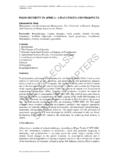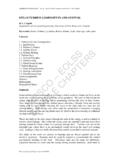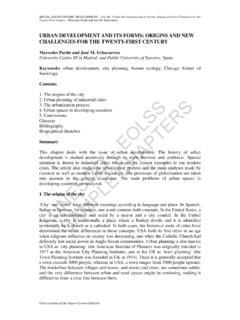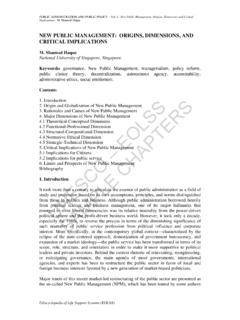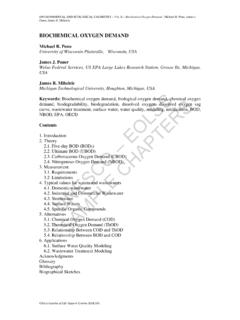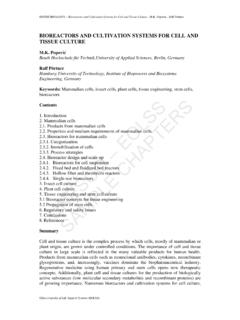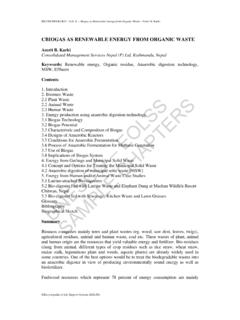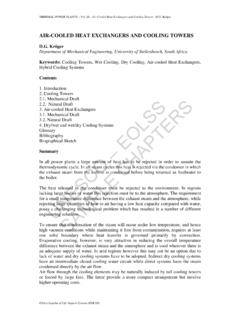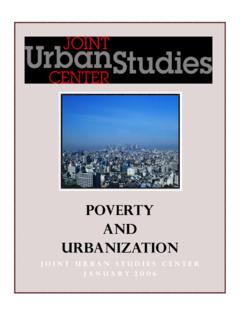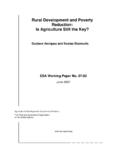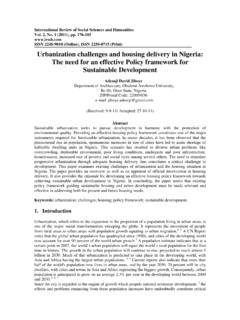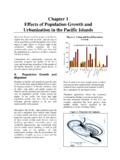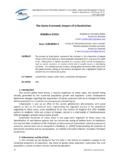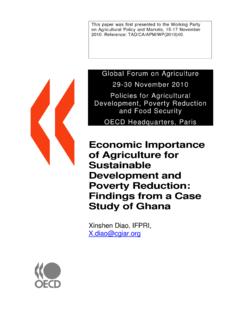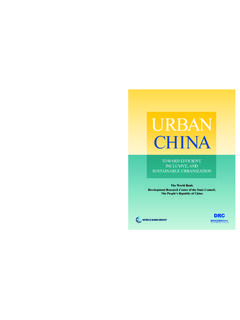Transcription of Urban Environmental Problems: Implications of …
1 UNESCO EOLSSSAMPLE CHAPTERSHUMAN SETTLEMENT DEVELOPMENT Vol. IV - Urban Environmental Problems: Implications of Rapid urbanization Without Adequate Urban Governance in Lesotho - Tsepiso Mohapi Encyclopedia of Life Support Systems (EOLSS) Urban Environmental PROBLEMS: Implications OF RAPID urbanization WITHOUT ADEQUATE Urban GOVERNANCE IN LESOTHO Tsepiso Mohapi Institute of Southern Africa Studies, National University of Lesotho, Lesotho, South Africa Keywords: urbanization , governance, planning, institutional framework, social, services, Environmental , Urban , health, land, housing, sanitation, overcrowding, poverty, sustainability, development, squatter settlements, Maseru, Lesotho Contents 1.
2 Introduction 2. Background 3. Urban Development and Services 4. Environmental and Social Problems and their Implications Social Problems Urban Poverty Housing Access to Public Amenities Crime and Vice Environmental Problems Pollution Waste Management Water Supply and Sanitation Health 5. Urban Environmental Challenge 6. Conclusion and Recommendations Glossary Bibliography Biographical Sketch Summary The massive influx of migration towards Urban areas, in developing countries has resulted in the over-population of these areas. Population is increasing at higher rates than the national government s ability to provide services for sustainable, healthy living environments.
3 Hence the vast majority of Third World cities are increasingly faced with the problems of deprived neighborhoods. Like most developing countries, Lesotho's Urban population has been growing at a higher rate than was anticipated and has resulted in uncontrolled, overcrowded, and unplanned Urban settlements extending into physical settlements ill-suited for human habitation; especially within the capital Maseru. As is well known, rapid urbanization has various Implications for the infrastructure and service needs of cities, since in most cases Urban populations are increasing at rates that are outstripping any reasonable expectations in improvements on housing, health care, employment opportunities, and infrastructure required for healthy living environments.
4 UNESCO EOLSSSAMPLE CHAPTERSHUMAN SETTLEMENT DEVELOPMENT Vol. IV - Urban Environmental Problems: Implications of Rapid urbanization Without Adequate Urban Governance in Lesotho - Tsepiso Mohapi Encyclopedia of Life Support Systems (EOLSS) The failure of government to expand water supply, sanitation, energy resources, security, social amenities, aesthetics, and transportation to the unplanned settlements in the Urban periphery where most of the Urban poor live has resulted in misery and Urban decay. The ongoing rapid urbanization without adequate Urban governance and service provision means that a substantial proportion of Lesotho's Urban population is at risk of Environmental hazards such as increasing Urban poverty, homelessness, ill-health, pollution, crime and vice among others.
5 This may also be a result of increasing Urban population with little or no consideration for the institutional framework to ensure that these Implications are addressed. Thus increasing the number and seriousness of Urban Environmental problems seems to have taken a severe toll on towns, and threaten all societies, poor and affluent alike. The purpose of this article is to discuss the Implications of rapid urbanization without adequate Urban governance and service provision on the Urban environment in Lesotho, with a particular focus on low-income settlements within Maseru. 1. Introduction Many Third World countries, including Lesotho, are presented with the problems of deteriorating infrastructure, Environmental degradation, inner city decay, and neighborhood collapse.
6 The present scale of cities development, and its corresponding impacts, is seen to be of a different magnitude to the extent that one cannot expect cities to be sustainable for much longer. These cities, like our local communities, can grow in a sustainable manner if they provide high social cohesion for all those who live in them. This therefore implies that developing countries should increase their capacities to produce and manage their Urban environments if only to maintain today's often extremely inadequate conditions. This increase in capacity is fundamental for developing countries to strive for healthy living environments as we move further into the twenty-first century.
7 Because the unprecedented expansion of Urban agglomerations leaves economic growth far behind, there is widespread concern over what is happening in Third World cities. The central question is how will Third World countries cope economically, environmentally, socially and politically with such acute concentrations of population in their cities? Hence the critical issue that needs to be addressed is the extent to which national governments can formulate and implement development policies that have a definite positive impact on trends in Urban growth and its management. 2. Background Lesotho is a mountainous enclave surrounded by the Republic of South Africa (RSA).
8 It has an approximate land area of 30 555 square kilometers. Lesotho's resource base is very limited, with only 9% of the total land area being arable, and is gradually declining due to severe soil erosion and squatter settlements. Agricultural productivity, since the 1980s, has declined drastically as a result of high population pressures on the already scarce arable land, poor soils, erratic rainfall, and increasing land degradation. The acute shortage of land has meant that for many years Lesotho has not been able to feed its people as land has become denuded. UNESCO EOLSSSAMPLE CHAPTERSHUMAN SETTLEMENT DEVELOPMENT Vol.
9 IV - Urban Environmental Problems: Implications of Rapid urbanization Without Adequate Urban Governance in Lesotho - Tsepiso Mohapi Encyclopedia of Life Support Systems (EOLSS) The economic prospects of the country are very bleak. Lesotho s average Gross National Product (GNP) per capita estimates are US$350, of which 40% is from remittances of migrant workers, thus indicating the economy's dependence on RSA. In fact 70% of average household income comes from labor migrant remittances and these migrant remittances accrued nationally surpass the Gross Domestic Product (GDP) in any given year. Given the rate of retrenchment since the 1980s, however, the GNP is expected to decline in the future.
10 Most of the GDP generated comes from the agricultural sector, which is also deteriorating. Lesotho has a negligible industrial sector comprising construction industries and light consumer goods industries. As a result, Lesotho's economy has a very limited capacity to produce adequate employment opportunities. The economic repercussions of the declining agricultural base and retrenchment of mine workers are very clear. The remittances have terminated to families dependent on them for a livelihood, and these families have to find viable alternative sources of income within the country. Unless employment opportunities are created soon to accommodate retrenched workers, the unemployed will flock in greater numbers into Urban areas and thus increase the problems of the Urban informal sector resulting in poverty, crime, homelessness, poor health, prostitution, and pollution which are already happening at present, especially in Maseru.
